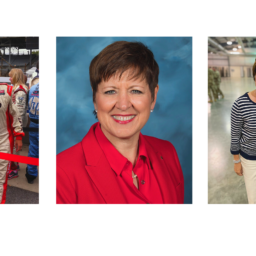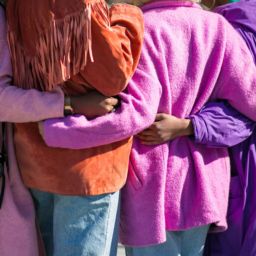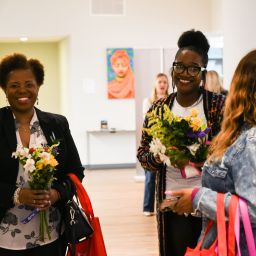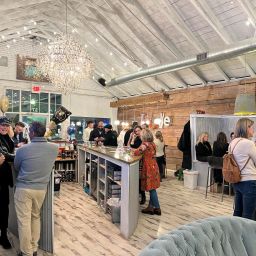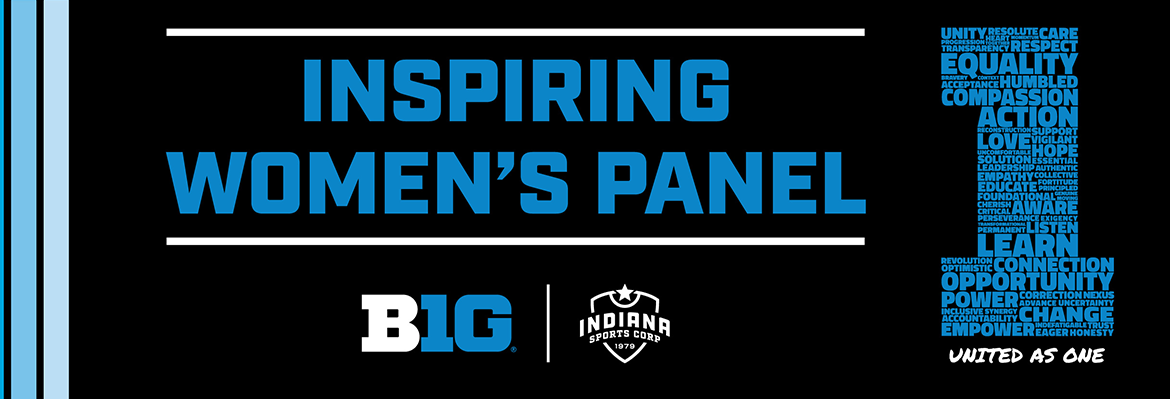
Indianapolis is celebrating International Women’s Day with a variety of festivities, one of which is Indiana Sports Corp’s Inspiring Women panel. On March 8 at 12 p.m., Indiana Sports Corp and the Big Ten Conference will be collaborating to host this exciting panel!
Pam Ross, the vice president for opportunity, equity, and inclusion at CICF, will moderate the panel. The panelists include Northwestern lacrosse goalie Madison Douchette, who is also a member of the Big Ten Conference Equity Council, and Indiana Fever power forward Jantel Lavender. The panel promises to focus on social justice work being done at the professional and collegiate athletic level. We can’t wait to see you there—virtually, of course.
Indy Maven had the incredible opportunity to chat with Jantel about the intersection of activism and sports as a preview to the panel.
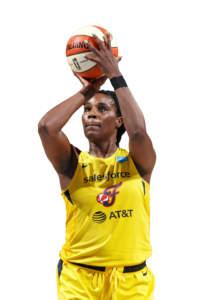 Well before 2020/2021, the women of the WNBA have been on the frontlines of the fight for social justice and racial equity. What do you think is it about the League and the players that has made that possible?
Well before 2020/2021, the women of the WNBA have been on the frontlines of the fight for social justice and racial equity. What do you think is it about the League and the players that has made that possible?
First, I think it is because we are the most recognizable women’s sports league in the country. Where this league has risen to ahead of its 25th season this summer has been incredible to see. But the second part of that is, for women, the fight for equality is still a work in progress. What we saw last year with the players in the “Wubble” was a unified group that knows where we believe this league can be when people watch and talk about the incredible women that are involved with the WNBA. We have continued to fight for our seat at the table and we are empowering more women in this league to use their voice.
What have you been doing personally regarding activism? Where did it begin?
I feel like I have been speaking out about equality as far back as I remember. I have had quite a few run-ins with cops and have directly experienced racism in so many forms that it has been hard for me not to speak up. And being a woman only adds fuel to all of that. I remember doing an interview when LeBron James’ house was vandalized a few years ago and I did a unity ride in California that directly benefited BLM movements. I participated in an LGBTQ March that was for Black trans individuals. I have recently joined the “Athlete to Advocate” program the Fever started with Anthem, Inc. and the IU School of Philanthropy to further my knowledge on being a philanthropist. This is near and dear to my heart and I’ll do whatever I can to try to bring this world to a loving place one person at a time.
How does the Pacers/Fever organization support players’ efforts?
The support of the players from Pacers Sports & Entertainment and the Indiana Fever was one of the main reasons for signing here this offseason. I’ve seen what someone like Tamika Catchings has done throughout her entire career that she spent here in Indiana and she is a true inspiration to what we want to be on and off the court. This organization is committed to its players, as well as helping the players become well-rounded individuals when talking about involvement with off-the-court initiatives.
How can a fan or any woman in Indy take what the players are doing and translate that into their own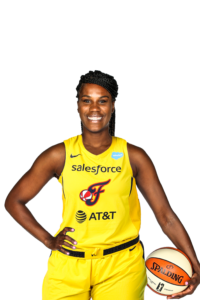 lives and activism?
lives and activism?
I think any time we take the court or you see us out in the community at various events, that is a step in the right direction and a positive influence for girls and women across this state. The type of platform we have now compared to when the WNBA started 25 years ago is completely different. When fans come back to see us play, I always think about the fact there might be a little girl in the stands watching a WNBA game for the first time. If she goes home after that game inspired to want to be us one day and be a professional athlete because of what she saw from myself or another Fever player, then I think we’re serving a greater purpose and being an inspiration that so many of us didn’t have when we were growing up.
What does support from the community look like to you and what do you hope to see more of going forward?
I hope we see our fans back when the season starts because we obviously know there is a true passion for basketball in the state of Indiana. I know we’re so excited to just be back to playing in Indianapolis after playing last season in the “Wubble” and we’re hoping fans will come out and cheer us on as safely as possible. I know our fans will help tell our stories by sharing them on social media with friends and family, as well and watch our games, which are available to stream for free throughout the state. Even though I wasn’t with the team last year, I’ve seen pictures of the marches that took place in Downtown Indianapolis and know we have support from the community with the social justice initiatives that matter to us as well.
What has been the most challenging thing for you, being vocal and political in a time when some people think athletes should “stick to sports”?
The challenging part for me personally is the fact that the “sport” is our job. Our income. That’s the biggest dilemma I think most athletes have. And that dilemma can include us asking ourselves do we actively fight for what’s right or is it being viewed as a distraction? It’s tough. I do think the NBA and WNBA have tried to allow things to be individualized where players can voice their feelings within the bubbles, such as NBA allowed players to write certain phrases on the back of jerseys and WNBA player tribute to women who were victims of police brutality. If there could be more of a balance where players didn’t feel so conflicted, I do feel there could be more movement on the equality side of things.
How do you take care of your own mental health during difficult times and still be able to function at such a high level in your job?
It’s important to take time for mental health because as athletes we are pulled in so many directions. The community looks to you as a platform and our ownership, coaches, front office, etc. wants to win games. But I just need to make sure I’m handling both as a professional. Meditation has been a huge outlet for me. It allows me to take time for myself and truly reflect on finding peace within so much going on in the world. Even if I only find time to do a two minute meditation, I do it.
To here more from Jantel and the rest of the panelists, register for the “Inspiring Women” panel on March 8 here.








